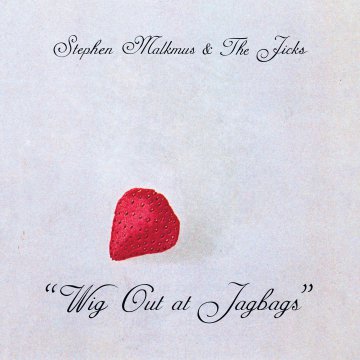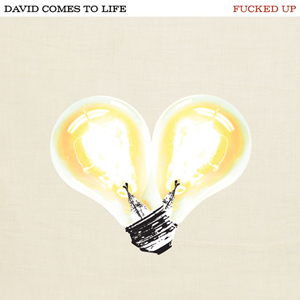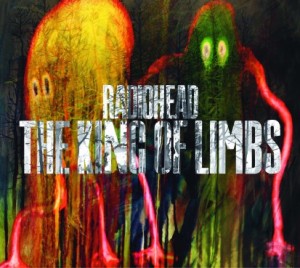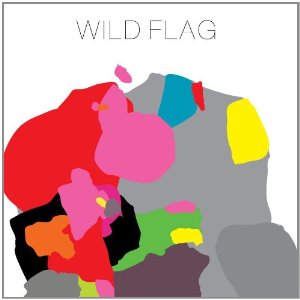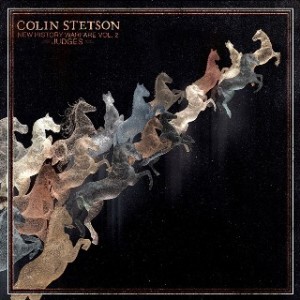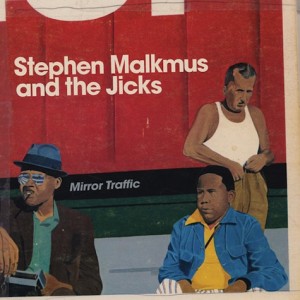For some reason there are some albums that I listen to a lot, but refuse to write about. I think that sometimes I just want to try to focus writing on bands and artists that aren’t getting much (or in some cases ANY coverage anywhere else), but I also listen to a lot of music every day, and I develop obsessions with albums that last for months at a time.
One of the albums that I’ve been stopping myself from writing about is the latest offering from Stephen Malkmus & The Jicks. This was probably the first significant release of the new year, and also the first album that I started listening to on a daily basis.
Unfortunately Malkmus is never going to be able to escape the shadow of Pavement, and his solo efforts are always going to be compared to their brilliant albums that have reached the heights of required listening to all up and coming indie music fans. I think that “Wig Out At Jagbags” is just as solid a release as his past solo efforts, each of which should be considered outside the bias that inevitably happens when reviewing his work against that of Pavement.
Lead single “Lariat” is more radio-friendly and just more welcoming in general than some of the more angular material that can be found on “Pig Lib” and “Mirror Traffic.” It seems as though Malkmus is more comfortable indulging his proggier side with a few additive rhythms here and there, some odd phrase structures, maybe a few dropped bars; he’s tinkering with form. Take for example “Houston Hades.” That opening (after the noisy intro) that goes on to become the textless chorus, features a bit of hypermetric irregularity. By that I mean that he’s shifting the measures around 4/4 + 2/4 + 4/4 + 2/4, which all adds up to 2 full bars of common time, but the accents are shifted around. That idea carries through to the outro section as well.
Malkmus’ songs make shifts like this, and all sorts of other aberrations of typical structures, sound smooth, and they are hardly noticeable unless you really make an effort to focus a bit on them. The buzzing, sustained guitar lead line that opens the album is placed over one such aberration, with the rhythm section chugging along in a protracted additive rhythm that blends right into the first verse. Sure, it sounds a touch off-kilter, but it is certainly not the focus of the section.
What I find particularly interesting about the songs, on this album as well as on past solo efforts, are Malkmus’ lyrics. Words strung together that partly resemble free association, followed by internal rhymes, allusion, word play and assonance (check out the line that leads into the titular line on “Independence Street” for example). At first listen it might just sound as though the words are thrown down as he sings them, without a care. The truth is is that his lyrics are regularly brilliantly constructed. It’s poetry done right, all of which is sung (with terrific prosody, mind you) in a natural, almost conversational delivery.
Well, I guess I take that back. Lyrics aren’t always delivered as such in every song. In fact, on “J Smoov” Malkmus does his best blue-eyed soul, singing in falsetto, supported by horns with the guitar pared down significantly.
Standout tracks, for me though, have to be “Chartjunk” and “Cinnamon and Lesbians,” the former of which features more use of horns, some rolling, bouncy guitar work and 3-part backing harmonies. “Cinnamon and Lesbians” is just a fun tune with a great deal of the aforementioned wordplay (as is the track “Scattegories” that precedes it), and of course it also has a (terrible) video that interprets each of the lyrics literally.
Malkmus has more tunes than he even knows what to do with. He makes everything sound so effortless and carefree, but if you dig a little bit it’s plain to hear that there is a lot of attention to detail within every line of every song. “Wig Out At Jagbags” came out last month on Matador and they just started the North American leg of their tour a few days ago, so make sure to get out there and see SM and Jicks. Apparently they are going with the hashtag #wigoutacrossamerica
Stephen Malkmus & The Jicks “Wig Out Across America”
Fri Feb 14, 2014
Columbia, MO | Mojo’s |
Sat Feb 15, 2014
St. Louis | Old Rock House |
Sun Feb 16, 2014
Omaha | The Waiting Room | *
Tue Feb 18, 2014
Minneapolis | Cedar Cultural Center | *
Wed Feb 19, 2014
Madison | High Noon Saloon | *
Thu Feb 20, 2014
Chicago | Lincoln Hall | +
Fri Feb 21, 2014
Ferndale, MI | The Loving Touch | +
Sat Feb 22, 2014
Toronto | Lee’s Palace | +
Sun Feb 23, 2014
Montreal | Cafe Campus | +
Tue Feb 25, 2014
Boston | Paradise | +
Wed Feb 26, 2014
NYC | Bowery | +
Thu Feb 27, 2014
Brooklyn | Music Hall of Williamsburg | %
Fri Feb 28, 2014
Washington DC | Black Cat | %
Sat Mar 1, 2014
Philadelphia | Theatre of Living Arts | %
Mon Mar 3, 2014
Carrboro | Cat’s Cradle | #
Tue Mar 4, 2014
Atlanta | Terminal West | #
Wed Mar 5, 2014
Birmingham | Bottletree | #
Thu Mar 6, 2014
New Orleans | The Parish @ HOB | #
Fri Mar 7, 2014
Houston | Fitzgerald’s Upstairs | #
Sun Mar 9, 2014
Dallas | Granada | #
Sat Mar 15, 2014
Portland | Star Theater |
Thu Mar 27, 2014
San Francisco | Slim’s | &
Fri Mar 28, 2014
Los Angeles | El Rey | &
Sat Mar 29, 2014
San Diego | Casbah | &
Sun Mar 30, 2014
Pioneertown, CA | Pappy and Harriet’s | &
Tue Apr 1, 2014
Phoenix | Crescent Ballroom | &
Wed Apr 2, 2014
Las Vegas | Beauty Bar | &
Thu Apr 3, 2014
Salt Lake City | Urban Lounge | &
Sat Apr 5, 2014
Missoula | Top Hat | &
Mon Apr 7, 2014
Calgary | Republik | &
Tue Apr 8, 2014
Edmonton | Starlite Room | &
Thu Apr 10, 2014
Vancouver | Rickshaw Theatre | &
Fri Apr 11, 2014
Victoria | Lucky Bar | &
Sat April 12, 2014
Seattle | Neptune | &
( * with Tyvek)
(+ with Disappears)
(% with Endless Boogie)
(# with Purling Hiss)
( with Sun Foot)
(& with Speedy Ortiz)

